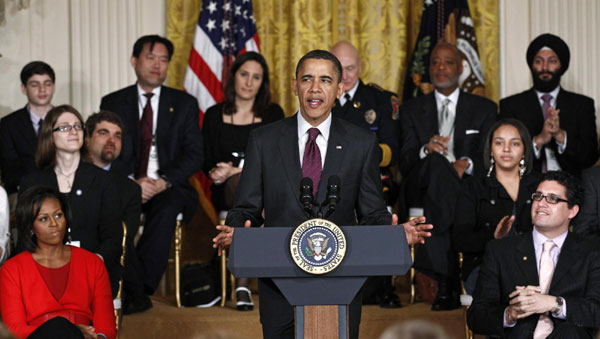NCTE @ the White House Conference on Bullying Prevention

I was honored to participate in the historic White House for a Conference on Bullying Prevention on March 10 on behalf of NCTE. At the White House’s invitation, I joined about 150 students, parents, researchers, policymakers and education leaders in a day long discussion that focused on the causes, effects, and solutions to bullying for all students. The vulnerability of LGBTQ youth was a major focus of discussion, as was targeting of students based on disability, religion and ethnicity, and the importance of strategies for ensuring that all students are respected and protected.
The morning started – as many events at the White House do – with more than an hour spent waiting in line, going through security, and being escorted to the right room. This was not dead time, however – there were a lot of introductions and conversations among attendees who came to the problem of bullying from a variety of different points of view and expertise. It wasn’t until a few moments after sitting down in the East Room that I realized I’d chosen a seat just a few feet from the podium where, shortly, the President and the First Lady arrived to deliver opening remarks. The First Lady noted that:
As parents, it breaks our hearts to think that any child feels afraid every day in the classroom, or on the playground, or even online. It breaks our hearts to think about any parent losing a child to bullying, or just wondering whether their kids will be safe when they leave for school in the morning.
The President issued a call to action:
We’ve got to make sure our young people know that if they’re in trouble, there are caring adults who can help and young adults that can help; that even if they’re having a tough time, they’re going to get through it, and there’s a whole world full of possibility waiting for them. We also have to make sure we’re doing everything we can so that no child is in that position in the first place. And this is a responsibility we all share -- a responsibility we have to teach all children the Golden Rule: We should treat others the way we want to be treated.
A panel discussion by leading researchers was followed by break-out discussions led by key administration officials. Mine was led by Russlyn Ali and Tom Perez, who head up civil rights enforcement at the Departments of Justice and Education. The discussion was free-flowing, informative and inspiring. Even more than the words of the President and the First Lady, I was moved by the courage of the parents and students in attendance who had felt the impact of bullying in their own lives and acted to prevent it from happening to others. For me, the best part of attending the conference was having the opportunity to meet and have conversations with leaders representing government, teachers, parents and youth across the country about the challenges and hazards that transgender and gender non-conforming students face. According to research by GLSEN, nearly half all of transgender students say they’ve been physically assaulted at school; nearly half say they’ve recently skipped school because of mistreatment; and more than one in three had heard staff make negative comments about their gender expression. The risks trans youth face are exacerbated when they are singled out by teachers or administrators over issues such as they way they dress or which restroom they use; more than 50% of trans students say they’ve avoided restrooms and locker rooms out of fear or discomfort. And research conducted by NCTE and the National Gay and Lesbian Task Force shows that bullying significantly increases trans youths’ risk for attempting suicide. Addressing these serious risks requires that educators and policymakers understand the experiences of transgender and gender non-conforming youth. In order to prevent bullying and protect youth, we need to create a culture of respect in schools and ensure that all students are included as equal members of the school community – regardless of their gender identity or expression, sexual orientation, religion, race, ethnicity, disability or any other factor. And we need to involve all parts of society in the solutions. Toward that end, the conference was used to announce the launch of no fewer than ten new anti-bullying campaigns and resources by participating organizations ranging from Facebook to the National PTA to StopBullying.gov, a federal website bringing together key resources, including resources on protecting LGBT youth. NCTE, together with our allies at GLSEN, PFLAG, the Trevor Project, and other LGBT advocates, will continue to work with agencies across the federal government to ensure that the Obama Administration does everything it can to protect and support our youth.

